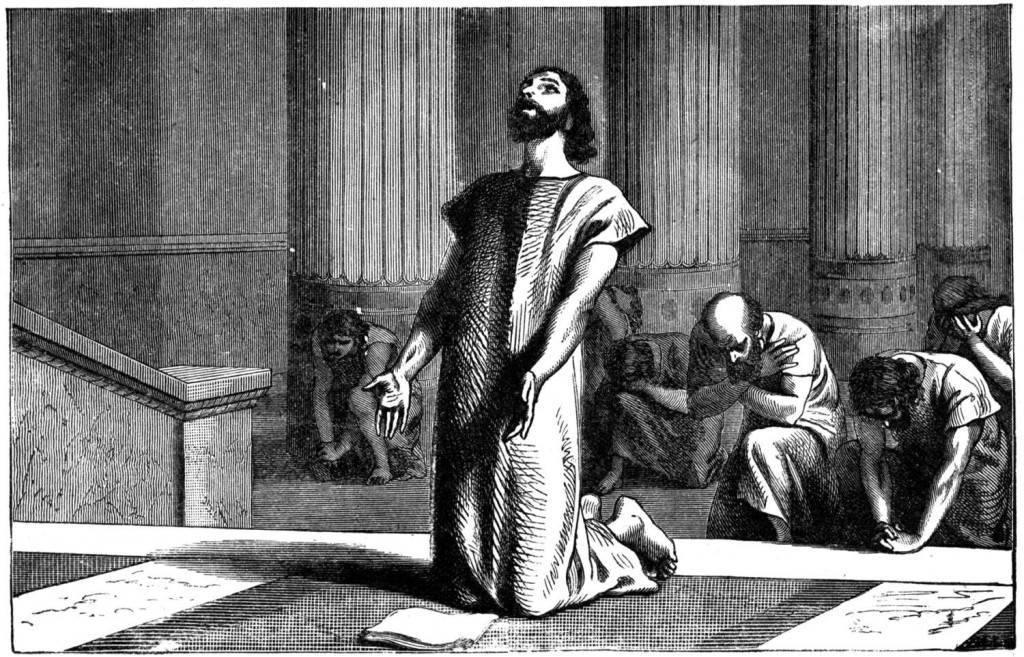Tag Archives: Elohim
Did Adam and Eve’s children commit incest?
Genesis 5:4, Sons and daughters. How did Adam and Eve’s children have children without committing incest, which is a sin according to the Torah (Deut 27:22). Does this fact prove the inconsistency of the Torah, thus invalidating it as a standard to be followed today?
As an example of this belief, one Christian teacher claims that YHVH’s law, “changes all the time.” As ‘proof’ he points to incest between Adam and Eve’s sons who had to marry their sisters for life to continue. Another example of this, the teacher claims, is Abraham marrying his half sister. Theses examples of incest appear to be direct contradiction of Deut 27:22, where we see the command that those who lie with their close family members will be cursed.
My response is as follows:
This teacher’s logic is very weak. This is arguing from a weak position and trying to leverage it into a strong argument. This a fallacious or specious argument, and shows little understanding of the rules of Biblical interpretation or basic logic. To take a weak or obscure verse out of the Bible and to use it as a pretext to disprove the validity of the rest of Scripture is a dishonest method of interpretation and fails to pass the scrutiny of solid scholarship.
First, it’s fallacious to take one obscure example out of the Scriptures and then use it to attempt to invalidate thousands of others strong, direct passages about the validity and inviolate nature of the Torah. There are so many scriptures to the last book of the Bible that shows that Torah is the standard of righteousness by which all humans are to live and by which YHVH will judge humans.
Second, underlying the whole of Torah is the heart, mind and will of Elohim. Torah reflects the character and nature of the Creator. Torah is a vast ocean or universe because it’s the mind of Elohim, which is limitless. Humans only have Continue reading
What about “I change not!” do we not understand?
Deuteronomy 31:10–13, You shall read this Torah before all Israel. Verses like this tend to expose the theological confusion that occurs in the minds of many Christian Bible teachers. For example, Christian commentator Matthew Henry on this verse writes about the need to read the Word of Elohim and that doing so will “help us to keep his commandments.” Yet elsewhere he says in the same commentary about the same laws that the commandments or laws of YHVH “are done away with.” Statements like these are representative of a split and incongruous, double-speak thinking on the part of many Christian Bible teachers and people when it comes to the commandments or laws of Elohim. Some laws, they say, we are to keep (e.g., thou shalt not murder, lie, commit adultery, etc.), but other laws we can disobey (e.g., the Sabbath, dietary laws, and biblical feasts). Is it possible to have it both ways: to believe that we need to keep his commandments, yet teach they are done away with? If so, then what is the meaning of such biblical phrases pertaining to YHVH’s Torah or Word as “forever,” “for a thousand generations,” “the same yesterday today and forever,” “till heaven and earth pass away,” “I change not,” and “think not that I came to destroy the Torah-law?” Is YHVH’s Word inconsistent and contradictory, or is this, instead, the case with the thinking of men? Is YHVH’s immutable character flawed with regard to keeping his Word, promises and standards or is man the one at fault?
Do we have a high enough view of YHVH Elohim and fear him and tremble at his Word (Isa 66:2), or have we, in reality, to demoted the veracity of his Word by contorting YHVH and his Word to fit the mindset of changeable and inconsistent man (which the Scriptures define as idolatry)? Have we bought into the lie that the serpent proffered at the tree of knowledge in the Garden of Eden when he told the man and the woman that YHVH really did not mean what he said and that humans can take the “have it your own way” and “pick and choose” approach when it comes to obeying the Word of YHVH (a philosophy that forms the basis for the religious movement called secular humanism, which is at the heart of all the religions of the world—including much of Christianity—except the true religion of the Bible)?
How many aspects of Christian theology are no more than a thinly veiled version of the religion of humanism in disguise? These are tough questions that we as redeemed Israelites need to ponder seriously. Let’s not forget the words of Yeshua in John 14:15, “If you love me, keep my [Torah] commandments” and the words of the apostle in 1 John 2:5–5, “He that says, ‘I know him,’ and does not keep his [Torah] commandments is a liar and the truth is not in him. But whosoever keeps his Word in him truly is the love of Elohim perfected: hereby know we that we are in him.”
The bottom line of why man has a hard time submitting to all of YHVH’s commandments is nowhere stated more concisely in the Bible than in Romans 8:7,
[T]he carnal mind is enmity against Elohim: for it is not subject to the law of Elohim, neither indeed can be.
Are you a blasphemer? Don’t say “No” too quickly!
On the one hand, many people claim to love the God of the Bible, and on the other hand, they are, often unwittingly, blaspheming him. How is this possible?
Deuteronomy 28:15, To the voice of YHVH. What is the voice of YHVH? Is his voice the voice that uttered the Torah at Mount Sinai? Is it the voice of his Spirit inside of you? Is it the voice of Yeshua as largely recorded in the red letters of the Testimony of Yeshua, or is it the entire Word of Elohim called the Scriptures?
If his voice is all of the above, then should any parts aspects of his voice contradict with any other?
If we have a theology where one aspect of YHVH’s voice contradicts with and another and we believe something he has said has been “done away with,” then what does this imply about the mind and nature of YHVH? There is a psychological term for this. It is called schizophrenia, a dual or multiple personality disorder or insane.
Now we would never dare label YHVH with such terms, for to do so would be blasphemy, yet many of our religious beliefs make YHVH into something that he is not, and we risk become an unwitting party to attaching this blasphemous labeling to the Almighty Creator if we subscribe to these false theologies.
One things is certain. YHVH is not a liar, nor does he ever contradict himself. If there seems to be a problem with inconsistency in YHVH’s Word the problem is with our misunderstanding or misinterpretation of it, and NOT with the actual Word or voice of YHVH!
Are you giving YHVH your best…or the leftovers?
Leviticus 22:1–31, Profane Vs. Holy. In this section of the Torah, YHVH makes some strong delineations between that which is profane, polluted or contaminated and that which is kadosh or set-apart in service to YHVH. To come into his Presence demands that men follow high and exacting standards. Why? It is to teach sinful man that although YHVH is high and lifted up above the mortal and mundane plane in his set-apartness and righteousness, he is not unapproachable by men if they will prepare themselves properly to come into his Presence. (Read Eccl 5:1–2.) He wanted to impress this upon the Israelites as they began the service of the tabernacle.
Therefore, YHVH specifies that certain offerings brought to his altar that are contaminated will be rejected if (a) the offerer is in a state of physical contamination, (b) he is contaminated through improper marriage, or (c) he is offering a blemished animal. What can we learn from this? What offerings do we bring to YHVH’s altar now? Our time, our money, our energy, our talents and spiritual gifts, our devotion? Do we give him the best? Do you pray to him and study his Word in the morning when you are the freshest, or do you give him the crumbs of your day after a hard day’s work just before bed when you offer up “sleepy time” prayers and read the Scriptures as your drifting off to sleep? Are your tithes the crumbs and leftovers after all the bills are paid, the government has taken out its portion and your play money has been set aside?
If you are a young person, are you serving YHVH while you have the health and vigor of youthfulness, or are you planning on playing now and serving YHVH after you have sated the lusts of the flesh? (Read Eccl 11:9–10; 12:1–14 and Matt 6:24.) Examine your life. Are you giving YHVH the best in all areas? If not, repent and change your priorities. Then see what happens in your spiritual walk and relationship with him!
Did YHVH Create Evil?
Isaiah 45:7, Create evil [or calamity]. Based on this verse some may be led to believe that all the evil that occurs in the world is YHVH’s fault, therefore, as the creator of evil, how can he be good? Some have even refused to serve and obey YHVH and rejected the truth of Scripture on the basis of this logic. But what is the truth?
First, let us analyze the Hebrew word for evil/[r (Strong’s H7451; TWOT 2191). It is the generic Hebrew word meaning evil also meaning “bad, disagreeable, malignant, unpleasant, sad, unhappy, wicked, distress, wrong, injury.
As we can see, evil is only one of the many and varied definitions of the Hbrew word ra which can also mean “distress, adversity, unhappiness and sadness.” Can “bad” things happen to people that end up being good for the person? Of course. Such has happened to all of us many times in our lives. Keep this point in mind.
According to The Theological Wordbook of the Old Testament, the word ra has as its primary definition “the lack of quality or inferior quality of something or someone and is thus unable to meet standards of value or function beneficially.” The word can connote Continue reading
What’s involved in coming into YHVH’s Presence? Much food for thought!
Exodus 19:10, Consecrate them today. How did Israel, as a bride-to-be, prepare herself to meet with YHVH? How are YHVH’s people now to be preparing themselves for their spiritual marriage with Yeshua? (Compare Exodus 19:10 with Revelation 19:7–9.) What is the righteousness of the saints (mentioned in Rev 19:8)? Righteousness is defined in Psalms 119:172 as, “… all thy [Torah] commandments are righteousness.” If what the Scriptures define as righteousness (i.e., the Torah) was “nailed to the cross,” as is popularly taught, then who is in error? The Scriptures or those who teach against YHVH’s Torah laws?
Discussion A. Why is it essential to study the example of the children of Israel preparing themselves to come into the presence of YHVH in Exodus 19? After all, if Yeshua did it all for us, we can just come boldly before the Father’s throne anytime, anyway we want, right (Heb 4:16)?
Let’s explore this concept a little to see what the Bible has to say about it.
Paul says in I Corinthians 10:11,
Now all these things happened to them [i.e., the children of Israel] as examples, and they were written for our admonition, upon whom the ends of the ages have come. (See also Rom 15:4.)
The writer of Hebrews has something similar to say in his prefatory remarks to his statement in Hebrews 4:16 about coming boldly before the throne of YHVH through the merits of the sinless righteousness of Yeshua our High Priest. In the preceding several verses, the author draws upon the example of the children of Israel (Heb 4:1–10) as an example for us not to follow. They were a faithless and disobedient lot in that they rebelled against the Torah-word of Elohim.
Then in Hebrew 4:11, the author starts with the connecting word “therefore,” indicating Continue reading




